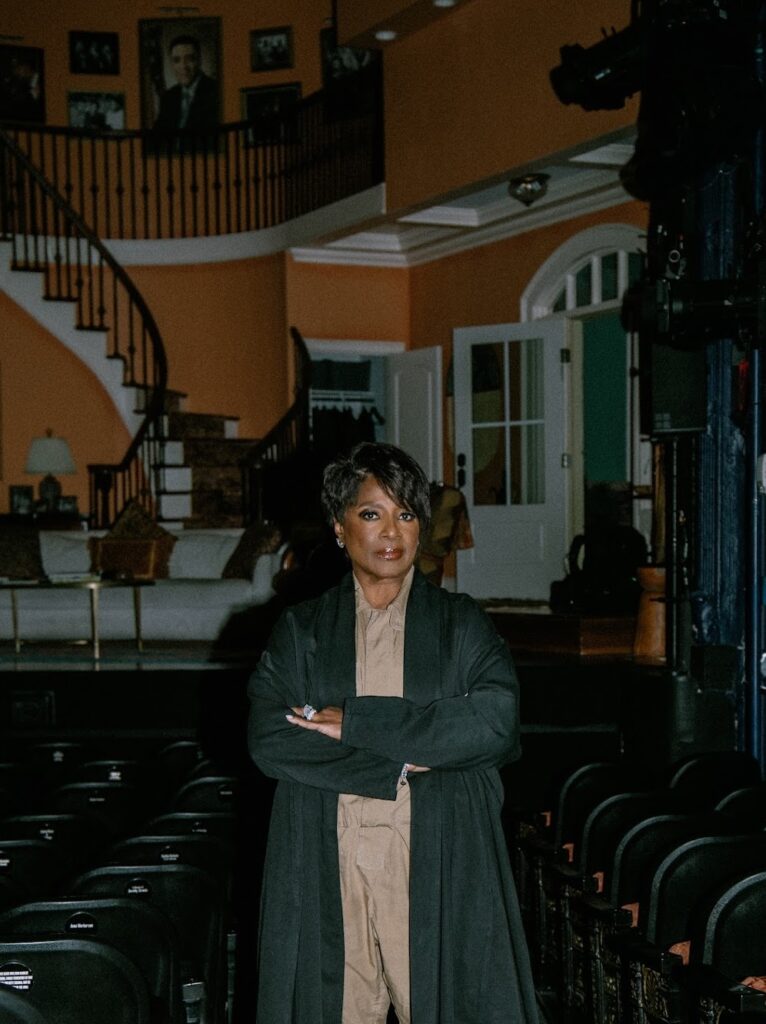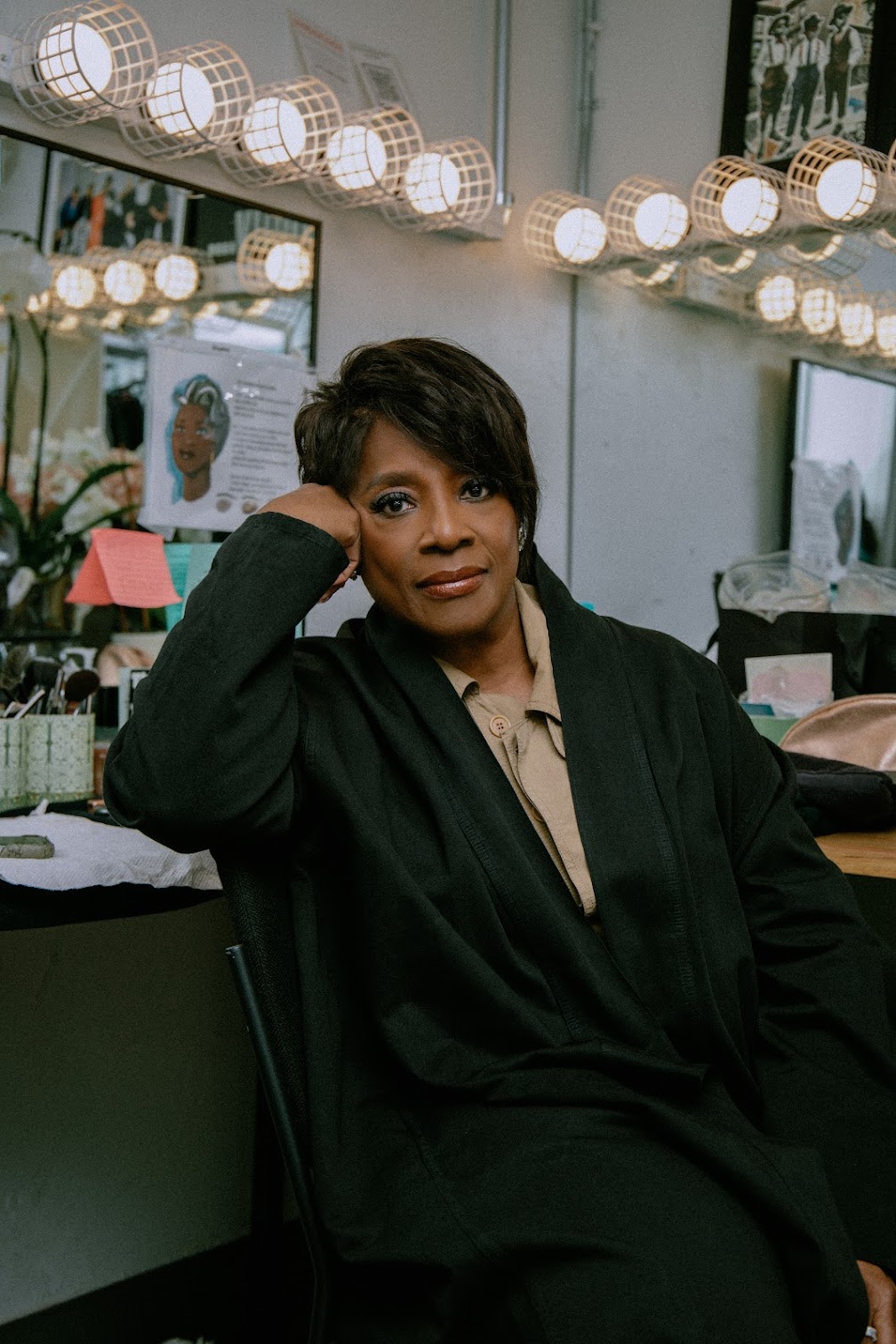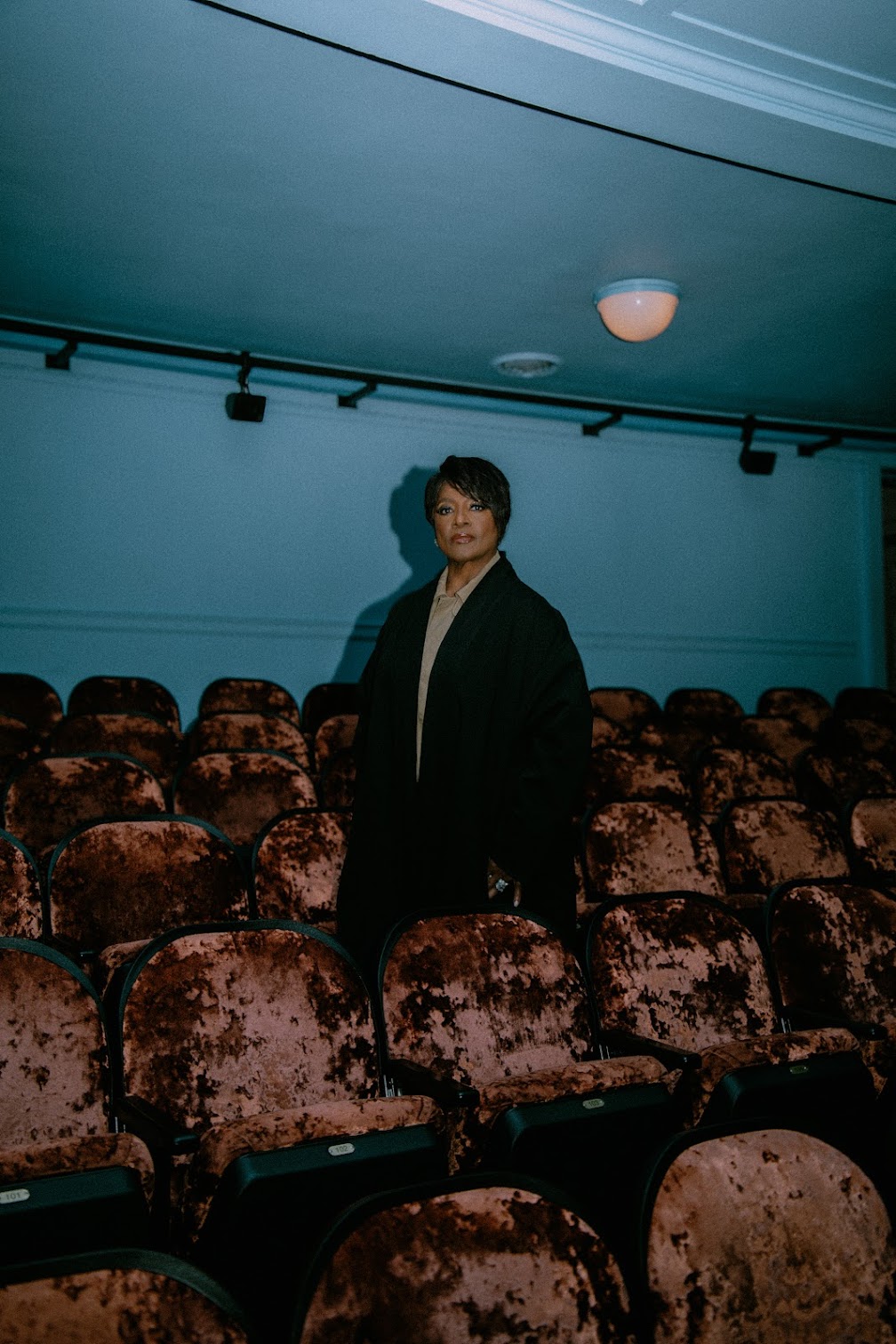The director George C. Wolfe has counted himself among the many LaTanya Richardson Jackson fans in the theatre community for almost 40 years. Since 1988, to be exact, when first he saw the actor and wife of Samuel L. Jackson in The Talented Tenth at The Manhattan Theatre Club. “I was a quasi LaTanya stalker,” he confessed on a Zoom last month. “I remember the monologue that you gave to the young girl. It had a degree of emotional hurt and rawness with an armor of sophistication, and I was very intrigued by the collision of those three things.” At this year’s Tony Awards, the two icons of contemporary theatre are nominated for their contributions to a couple of the year’s most lauded productions, Wolfe as the director of Gypsy and Jackson as matriarch Claudine Jasper in Purpose, the explosive play by Branden Jacobs-Jenkins that won the Pulitzer Prize for Drama earlier this month. It’s a complex and particularly juicy role for the actor, who was last nominated in 2014 as the lead in A Raisin in the Sun. As next weekend’s ceremony approaches, Jackson and Wolfe got a call to talk about fun vs. fulfillment, acting vs. directing, and their past encounters with a few fellow legends, including Sidney Lumet, Meryl Streep, and Jeffery Wright.
———
GEORGE C. WOLFE: So, what was your first job in New York as an actor?
LATANYA RICHARDSON JACKSON: Oh, wow. I just mentioned that the other day because Woody King came to the play Saturday at Henry Street Playhouse. Perdido by Soledad was my first play at Henry Street Settlement.
WOLFE: Do you remember anything about it?
JACKSON: Yeah. It was a Latino production about the people in the barrio, the Black people who lived there as well as the Latinos who lived there. At that time, remember, there was the idea that urban culture was, may I say, violent, and we were trying to live in a setting that was always challenging. “Palabras” is words. In that setting, our words mattered, and sometimes our words were so volatile it prompted us into fights and situations that didn’t necessarily have to be.
WOLFE: How soon after you arrived in New York did you get that job?
JACKSON: Immediately.
WOLFE: Look at that. Right off the plane and she gets hired.
JACKSON: I did. It was so amazing. The next thing was Joseph Papp.
WOLFE: You did something from Henry Street and then you went to the Public Theater.
JACKSON: And stayed at the Public Theater for over nine years.
WOLFE: What happened to struggling and starving? That didn’t happen for you?
JACKSON: It did. I was struggling. We were working for car tokens. You didn’t ask me if we were getting paid. [Laughs] We were getting subway rides, so you had to come with something. I was with my husband Sam [L. Jackson].
WOLFE: Oh my god. You guys got married that soon?
JACKSON: No, we weren’t married. I just realized that. I’m a woman of a certain age, so sometimes I get confused. We got married in ’80, but we came to New York in ’76, in the middle of the Halloween parade.
WOLFE: I love it. What was your first show at the Public?
JACKSON: Aishah Rahman’s Unfinished Women Cry in No Man’s Land While a Bird Dies in a Gilded Cage, a polydrama.
WOLFE: Oh my goodness. That wouldn’t fit on a T-shirt. That’s a play unto itself.
JACKSON: It was. I was always doing something at the Public, and it defined my entering into a community of theater in New York at that time, which was so full before the AIDS pandemic and everything else. It’s full now, but in a different way. There were so many extraordinary actors who were bold and non-conformist, who were just dancing on their left foot. I was so intrigued by what they could do and what my little country bumpkin ass was bringing to the table. I was like, “Yes, I dance on my left foot too.”
WOLFE: That’s wonderful. I could have sworn the first time I saw you was in Spell #7 at the Public.
JACKSON: Right.
WOLFE: I was a quasi LaTanya stalker. I saw you in that, and then I saw you in The Talented Tenth.
JACKSON: Oh yeah, at Manhattan Theater Club!
WOLFE: I remember your performance very vividly. I was telling somebody about it the other day because you’re on everybody’s mind these days, because of your performance in Purpose.
JACKSON: I love you for that.
WOLFE: I remember the monologue that you gave to the young girl who was trying to steal your husband or something to that effect. It had a degree of emotional hurt and rawness with an armor of sophistication, and I was very intrigued by the collision of those three things operating at one moment.
JACKSON: Well, I think that armor was learned at Spelman College. We were taught elocution from an early age—thank you, Dr. Martin Luther King. Everyone has a certain speech pattern that they fall into that sort of corrects any street language they might be embroiled in for an emotional resonance. This is a way of translating whatever the language is that you are given in text to a [natural] way. I feel like I’m going through that right now in Purpose.
WOLFE: That quality of doing what must be done, being acutely aware of the figure that you cut in the world, and doing it with grace or toughness or grit—it’s all packaged inside of this veneer of extraordinary command. It’s extraordinarily fun to watch.
JACKSON: Thank you, George. It’s an extraordinary amount of work, too.
WOLFE: Of course.
JACKSON: First of all, I’ve got ADD, so I got voices in my head all the damn time saying, “Am I doing this [right]?” You told me once, “Stop talking to yourself.” And I said, “I can’t,” but I tried. That was the best note I could have been given. “I see it when you start talking to yourself.” I said, “Oh, shit, I’m talking to myself.” And I absolutely do. So releasing it into the character becomes one of my challenges.
WOLFE: Are you having fun or is it still the rigor of the work?
JACKSON: It’s all of that. I never term it “fun.” Someone else major just asked me that. He asked me if I was having fun and I said, “I am fulfilled.” I do this show and I feel satiated, I feel full. If that’s fun, yes.
WOLFE: I understand exactly what you’re saying. The more I do it, the more all the shit that surrounds it becomes less interesting to me. Once upon a time there was, “Oh gosh, Broadway—here I am.” And over time, all of that keeps falling away and what remains is the love of getting it right, or in my case as a director, helping other people get it right. The rigor is the thing that I love most of all. Any of the foolishness that is cosmetic to that journey, I no longer bother with it.
JACKSON: Touché to that. The play is the thing.
WOLFE: In the film work that you’ve done, have you ever felt that same sense of being full?
JACKSON: No. I have always kind of been afraid of that camera. Maybe a little in The Fighting Temptations, but that was a zany work. Mostly because I was intimidated by the way I look, and by what I felt people were seeking in the look of a character. Film is such a visual medium, and I always felt like everyone was looking for something else in what I looked like or did not look like. And the theater has always felt like such a welcoming womb to me. People say, “You are on the stage [in front of] that audience, don’t you feel…?” And I say, “You know what’s uncanny? I feel at home on the stage.” I feel nurtured and I feel welcomed. With film, I haven’t worked to get over whatever I needed to in order to be very successful with it.
WOLFE: That’s really interesting. The first film I did, which was Lackawanna Blues, I just went, “It’s a character at the party. That’s who that person’s going to be. I’m going to turn him into somebody that I know.” I refused to let it be the alien creature that it looks like and made it into a person. What’s fascinating to me about film is that you don’t ever have to put away your obsessive insaneness and make room. Even while actors are working, you’re still picking at it and picking at it, and I find that fun. Every time I work in film, before I do anything, I clear everybody away and just play for 30 minutes to an hour with the actors on the scene to build up confidence inside of them for when all these external elements come in. That’s exactly what you’re talking about.
JACKSON: Where did you learn that?
WOLFE: In the theater. Interestingly enough, when I was doing Mother Courage and Her Children, Meryl [Streep] told me the story that when they were doing Sophie’s Choice, they would rehearse in the morning, just the actors and the director, and then in the afternoon, everybody else would come in. It went so quickly because you weren’t using rehearsal time for actors to figure out what the hell they were doing. I always find that if you give actors permission to not know, they’re more likely to know. And from that knowing place, the work springs forth. Once they feel safe, you can go, “Okay, I need you to hang off a cliff and hold on with your teeth,” but because they feel safe, they will go with you.
JACKSON: My old friend Sidney Lumet used to say the same thing.
WOLFE: I love Sidney. His daughter told me that he had this wonderful phrase that he used to say: “What’s the point of having a grudge if you can’t keep it?”
JACKSON: Because he was that guy.
WOLFE: And he was that theater guy. He came to see almost all of my plays. He was very, very sweet and generous.
JACKSON: I miss him a lot.
WOLFE: How does directing fit into that with you?
JACKSON: I always want it to happen how it’s in my head. George, Kenny [Leon], all of you have been so great at letting me tell you how I see things, but also, “Go direct your own shit.” That has been in my heart forever. I just didn’t do it because I was always seduced by the acting. But I have this great love for directing. I want to have a vision about what I see the writer has done and I want to add to it.
WOLFE: Very interesting. I acted in college, but when I would act, I knew the correct rhythm of the scene, so I would surrender my subjective truth. I would try to manipulate the other actor to do the correct thing, and I thought, “George, that’s not acting. That’s directing.” I remember I directed a show that I had written in college, and there was something incredibly funny that was happening, and the audience was laughing and laughing, but built into the direction was a moment where everything shifts and becomes very serious and quiet. I remember the first time seeing that rhythm play out with an audience, standing at the back of Holmes Hall at Pomona College and seeing an entire body of people move as if they were a herd. That’s when I went, “It’s more fun doing this.”
JACKSON: It’s special. I think you have to be a very special kind of person to have that kind of vision. Not everybody has that. I want to do it so bad. I tried to direct Purpose. My agents told me to shut up and not say that. When they called and told me about the part, I said, “Can Felicia be the part and she lets me direct?” That was the first thing out of my mouth.
WOLFE: That’s funny. You say you feel so at home on stage, but there’s a part of your brain going, “What if it moved like this?”
JACKSON: Always. In the theater, I’m clocking it all the time. I’m in an extraordinary play with extraordinary people. These Steppenwolf kids, my baby New Yorker Kara Young, Glenn Davis and John Mitchell Hill and Alana Arenas and Harry Lennox and them had done the play. Kara and I were the only ones who had not done it. So I was thinking, “Am I fitting in? Am I bringing something new?” We’re going to fit as well as we can, but can you come to this table?
WOLFE: Yeah. It lets the table be big enough. When I became the director of Angels [in America], I brought in three new actors: David Marshall Grant, Marcia Gay Harden, and Jeffrey Wright. Combustion is going to happen, because it’s three new people, but the combustion is part of the fun because it reminds people to still venture with excitement toward the unknown. That’s sort of my favorite part of the work. I love holding onto not knowing for as long as I can. I’ve said this many times, that an audience can tell when they’re in the presence of a recycled truth, and they can tell when they are in the presence of a truth that was discovered just for them.
JACKSON: I must say, that’s the one thing I find in your work that’s so bold. You always make room for the unimaginable.
WOLFE: I think there are two fundamental schools of directing. You stand where you are and demand everybody comes to you, or you go to where they are, and you woo, charm, challenge, question. I choose to do the second. Actors are really miraculous people. It’s almost like an insect. They have all these antennas that sense and absorb things, and you want them to bring everything they’ve been absorbing their entire lives and unleash it into this role. It’s so interesting that you began the conversation talking about what you learned at Spelman, because when I watch you on stage, I feel like I’m in the presence of your various selves.
JACKSON: Various is a good way to put it.
WOLFE: Your Spelman self, your New York self, your mother self, your responsible woman self, your responsible person of color self. I see all those dancing with each other on stage, and it’s a wonderful thing to witness.
JACKSON: Hallelujah. That Branden Jacobs-Jenkins is extraordinary in bringing that out in me at this age. I appreciate this young man.
WOLFE: Branden is extraordinary. But when I saw you in your early plays as well, in Spell #7 or The Talented Tenth, that was present with you back then. I don’t think you know how to not do that.
JACKSON: Oh, god. [Laughs] I’m going to take that, George. I tell people, “This is what I have to give. This is my offering.”
WOLFE: And it’s a gorgeous thing to give.
Content shared from www.interviewmagazine.com.



